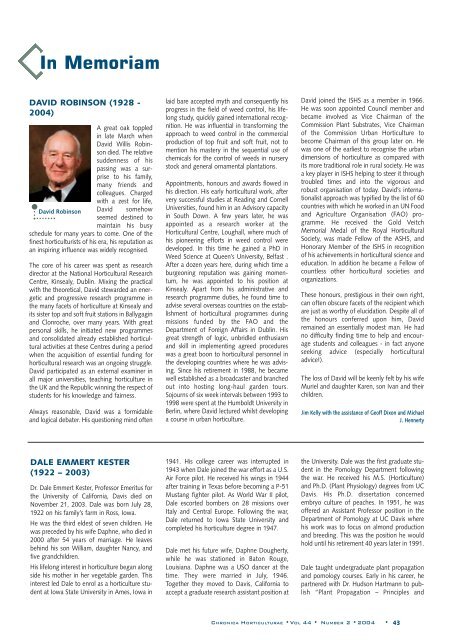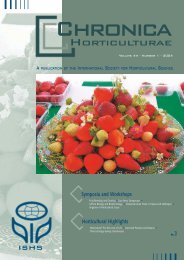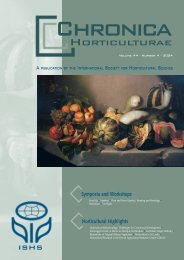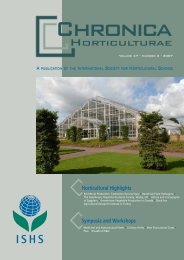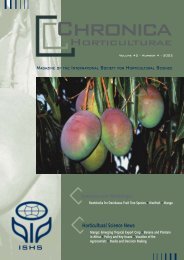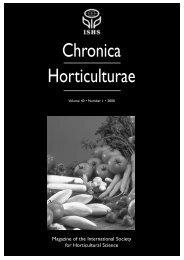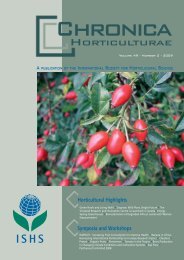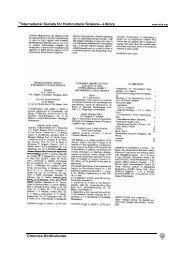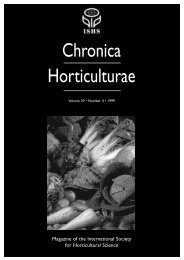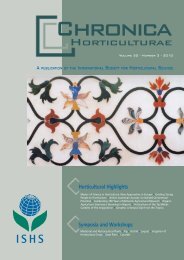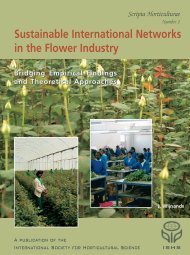Number 2 - 2004 - Acta Horticulturae
Number 2 - 2004 - Acta Horticulturae
Number 2 - 2004 - Acta Horticulturae
You also want an ePaper? Increase the reach of your titles
YUMPU automatically turns print PDFs into web optimized ePapers that Google loves.
In Memoriam<br />
DAVID ROBINSON (1928 -<br />
<strong>2004</strong>)<br />
A great oak toppled<br />
in late March when<br />
David Willis Robinson<br />
died. The relative<br />
suddenness of his<br />
passing was a surprise<br />
to his family,<br />
many friends and<br />
colleagues. Charged<br />
with a zest for life,<br />
David Robinson David somehow<br />
seemed destined to<br />
maintain his busy<br />
schedule for many years to come. One of the<br />
finest horticulturists of his era, his reputation as<br />
an inspiring influence was widely recognised.<br />
The core of his career was spent as research<br />
director at the National Horticultural Research<br />
Centre, Kinsealy, Dublin. Mixing the practical<br />
with the theoretical, David stewarded an energetic<br />
and progressive research programme in<br />
the many facets of horticulture at Kinsealy and<br />
its sister top and soft fruit stations in Ballygagin<br />
and Clonroche, over many years. With great<br />
personal skills, he initiated new programmes<br />
and consolidated already established horticultural<br />
activities at these Centres during a period<br />
when the acquisition of essential funding for<br />
horticultural research was an ongoing struggle.<br />
David participated as an external examiner in<br />
all major universities, teaching horticulture in<br />
the UK and the Republic winning the respect of<br />
students for his knowledge and fairness.<br />
Always reasonable, David was a formidable<br />
and logical debater. His questioning mind often<br />
laid bare accepted myth and consequently his<br />
progress in the field of weed control, his lifelong<br />
study, quickly gained international recognition.<br />
He was influential in transforming the<br />
approach to weed control in the commercial<br />
production of top fruit and soft fruit, not to<br />
mention his mastery in the sequential use of<br />
chemicals for the control of weeds in nursery<br />
stock and general ornamental plantations.<br />
Appointments, honours and awards flowed in<br />
his direction. His early horticultural work, after<br />
very successful studies at Reading and Cornell<br />
Universities, found him in an Advisory capacity<br />
in South Down. A few years later, he was<br />
appointed as a research worker at the<br />
Horticultural Centre, Loughall, where much of<br />
his pioneering efforts in weed control were<br />
developed. In this time he gained a PhD in<br />
Weed Science at Queen’s University, Belfast .<br />
After a dozen years here, during which time a<br />
burgeoning reputation was gaining momentum,<br />
he was appointed to his position at<br />
Kinsealy. Apart from his administrative and<br />
research programme duties, he found time to<br />
advise several overseas countries on the establishment<br />
of horticultural programmes during<br />
missions funded by the FAO and the<br />
Department of Foreign Affairs in Dublin. His<br />
great strength of logic, unbridled enthusiasm<br />
and skill in implementing agreed procedures<br />
was a great boon to horticultural personnel in<br />
the developing countries where he was advising.<br />
Since his retirement in 1988, he became<br />
well established as a broadcaster and branched<br />
out into hosting long-haul garden tours.<br />
Sojourns of six week intervals between 1993 to<br />
1998 were spent at the Humboldt University in<br />
Berlin, where David lectured whilst developing<br />
a course in urban horticulture.<br />
David joined the ISHS as a member in 1966.<br />
He was soon appointed Council member and<br />
became involved as Vice Chairman of the<br />
Commission Plant Substrates, Vice Chairman<br />
of the Commission Urban Horticulture to<br />
become Chairman of this group later on. He<br />
was one of the earliest to recognise the urban<br />
dimensions of horticulture as compared with<br />
its more traditional role in rural society. He was<br />
a key player in ISHS helping to steer it through<br />
troubled times and into the vigorous and<br />
robust organisation of today. David’s internationalist<br />
approach was typified by the list of 60<br />
countries with which he worked in an UN Food<br />
and Agriculture Organisation (FAO) programme.<br />
He received the Gold Veitch<br />
Memorial Medal of the Royal Horticultural<br />
Society, was made Fellow of the ASHS, and<br />
Honorary Member of the ISHS in recognition<br />
of his achievements in horticultural science and<br />
education. In addition he became a Fellow of<br />
countless other horticultural societies and<br />
organizations.<br />
These honours, prestigious in their own right,<br />
can often obscure facets of the recipient which<br />
are just as worthy of elucidation. Despite all of<br />
the honours conferred upon him, David<br />
remained an essentially modest man. He had<br />
no difficulty finding time to help and encourage<br />
students and colleagues - in fact anyone<br />
seeking advice (especially horticultural<br />
advice!).<br />
The loss of David will be keenly felt by his wife<br />
Muriel and daughter Karen, son Ivan and their<br />
children.<br />
Jim Kelly with the assistance of Geoff Dixon and Michael<br />
J. Hennerty<br />
DALE EMMERT KESTER<br />
(1922 – 2003)<br />
Dr. Dale Emmert Kester, Professor Emeritus for<br />
the University of California, Davis died on<br />
November 21, 2003. Dale was born July 28,<br />
1922 on his family’s farm in Ross, Iowa.<br />
He was the third eldest of seven children. He<br />
was preceded by his wife Daphne, who died in<br />
2000 after 54 years of marriage. He leaves<br />
behind his son William, daughter Nancy, and<br />
five grandchildren.<br />
His lifelong interest in horticulture began along<br />
side his mother in her vegetable garden. This<br />
interest led Dale to enrol as a horticulture student<br />
at Iowa State University in Ames, Iowa in<br />
1941. His college career was interrupted in<br />
1943 when Dale joined the war effort as a U.S.<br />
Air Force pilot. He received his wings in 1944<br />
after training in Texas before becoming a P-51<br />
Mustang fighter pilot. As World War II pilot,<br />
Dale escorted bombers on 28 missions over<br />
Italy and Central Europe. Following the war,<br />
Dale returned to Iowa State University and<br />
completed his horticulture degree in 1947.<br />
Dale met his future wife, Daphne Dougherty,<br />
while he was stationed in Baton Rouge,<br />
Louisiana. Daphne was a USO dancer at the<br />
time. They were married in July, 1946.<br />
Together they moved to Davis, California to<br />
accept a graduate research assistant position at<br />
the University. Dale was the first graduate student<br />
in the Pomology Department following<br />
the war. He received his M.S. (Horticulture)<br />
and Ph.D. (Plant Physiology) degrees from UC<br />
Davis. His Ph.D. dissertation concerned<br />
embryo culture of peaches. In 1951, he was<br />
offered an Assistant Professor position in the<br />
Department of Pomology at UC Davis where<br />
his work was to focus on almond production<br />
and breeding. This was the position he would<br />
hold until his retirement 40 years later in 1991.<br />
Dale taught undergraduate plant propagation<br />
and pomology courses. Early in his career, he<br />
partnered with Dr. Hudson Hartmann to publish<br />
“Plant Propagation – Principles and<br />
CHRONICA HORTICULTURAE •VOL 44 • NUMBER 2 • <strong>2004</strong> • 43


